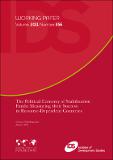| dc.contributor.author | Bagattini, Gustavo Yudi | |
| dc.date.accessioned | 2011-05-19T15:08:05Z | |
| dc.date.available | 2011-05-19T15:08:05Z | |
| dc.date.issued | 2011-04 | |
| dc.identifier.citation | Yudi Bagattini, G. (2011) 'Political Economy of Stabilisation Funds: Measuring their Effectiveness in Resource-Dependent Countries', IDS Working Paper 356, Brighton: IDS | en_GB |
| dc.identifier.isbn | 978 1 85864 964 1 | |
| dc.identifier.uri | https://opendocs.ids.ac.uk/opendocs/handle/20.500.12413/892 | |
| dc.description.abstract | This paper seeks to make a meaningful contribution to the literature on the use of stabilisation funds in resource-dependent countries, by proposing a new manner by which to measure their effectiveness. Since the 1950s, over 30 countries have used these instruments to stabilise resource revenues into their budgets to avoid the resource curse and Dutch disease and/or to save income from non-renewables. As has been documented by case studies, these countries have had a mixed record in attaining their goals. This paper is novel in that it aggregates quantitative results of fund performance through the compilation of a new database of detailed fiscal indicators for, put together through the extraction of data from hundreds of IMF documents containing official government data. The cross-country analysis of fiscal performance provides a new direction for the measurement of the effectiveness of stabilisation funds and the underlying political economy reasons for their success or failure. Because these funds serve a purpose of both stabilisation and savings, it is argued that their effectiveness should be measured by a success variable which is an indicator of sustainable fiscal performance. This is defined by its impact along three dimensions: fiscal revenues, fiscal expenditures and savings. By looking at the underlying economic and political conditions, as well as the attributes of stabilisation funds which drive success, some interesting conclusions are reached. First, stabilisation funds matter. Although there is no a priori economic reason to create one, their presence leads to better fiscal outcomes. Second, the governance of stabilisation funds is the most important factor in determining their success. An independent civil service is positive for success, while open and regulated political systems are actually found to be detrimental, contrary to what the literature assumed. Finally, the rules of the stabilisation fund are also crucial. Discretion over resources is negative for success, while earmarking is positive. This means that these funds work best when they are relatively rigid and less susceptible to capture by politicians. | en_GB |
| dc.language.iso | en | en_GB |
| dc.publisher | Institute of Development Studies (UK) | en_GB |
| dc.relation.ispartofseries | IDS Working Paper;356 | |
| dc.rights.uri | http://www.ids.ac.uk/files/dmfile/IDSOpenDocsStandardTermsOfUse.pdf | |
| dc.subject | Governance | en_GB |
| dc.subject | Finance | en_GB |
| dc.title | Political economy of stabilisation funds: measuring their effectiveness in resource-dependent countries | en_GB |
| dc.type | IDS Working Paper | en_GB |
| dc.rights.holder | Institute of Development Studies | en_GB |
| dc.identifier.externaluri | http://www.ntd.co.uk/idsbookshop/details.asp?id=1193 | en_GB |
| dc.identifier.blds | 322032 | |

